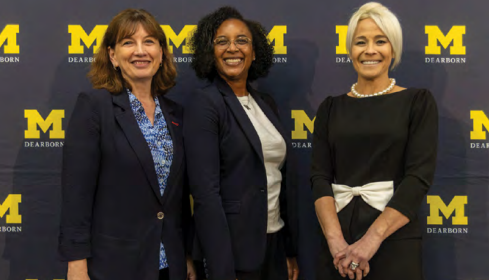Research by Stanford University social psychologists Geoffrey Cohen and Gregory Walton underscores how feelings of disconnection shape students’ interpretations of daily challenges, often leading them to perceive negative events as signs they don’t belong. Conversely, a strong sense of belonging fosters resilience, reduces depression and anxiety, and supports academic persistence.
Recognizing the critical role of belonging, the University of Michigan-Dearborn (UM-Dearborn) is breaking the mold for how colleges cultivate connected communities. Moving beyond traditional methods like student clubs and affinity groups, the university is pioneering new strategies that prioritize connection and inclusion across campus.
At the heart of these efforts is the newly established Office of Holistic Excellence (OHE), which uses storytelling as a powerful tool to foster understanding and connection. OHE has redefined DEI (diversity, equity, and inclusion) as a dynamic and immersive series of initiatives. Rather than focusing solely on race, ethnicity, or culture, the office expands these conversations to include diversity of thought, marginalized perspectives, and bias awareness.
Through transformative teaching, civil discourse, and truth-seeking, UM-Dearborn is creating an adaptable and equitable campus community. By complementing existing efforts and broadening their scope, the university exemplifies a forward-thinking approach to inclusive excellence.
Led by Rima Berry-Hung, director of human resources; Shareia Carter, MLS, director of the Center for Social Justice and Inclusion; and Marie Waung, PhD, associate dean of the College of Arts, Sciences, and Letters, OHE programs encompass a broad spectrum of personal experiences, integrating empathy, belonging, and understanding into the very fabric of the university’s community and culture.
All the storytelling initiatives emphasize “ways of knowing,” a concept that highlights the varied modes of reasoning that individuals bring from both personal and academic contexts. The principles underpinning OHE draw inspiration from the book “Intellectual Empathy: Critical Thinking for Social Justice” by Maureen Linker, PhD, associate provost and professor of philosophy at UM-Dearborn.
“It’s not about simply ‘walking in someone else’s shoes,’ but rather gathering accurate data about others’ lives to address inequalities and develop empathy,” Linker explains. These concepts are central to the university’s storytelling efforts, which encourage participants to reflect on implicit biases, understand social differences, and create narratives that highlight the complex interplay of intersectional identities. “The goal is to capture both the social and personal aspects of an individual’s story, fostering mutual understanding and self-awareness,” Linker says.
Chancellor Domenico Grasso, PhD, underscores the importance of this approach, saying, “People have different modes of thinking because of their lived experiences but also because of their fields. This disciplinary diversity helps our students and faculty appreciate varied perspectives, even within professional frameworks.”
More Than a Single Program
“For years, DEI has been about dotting the i’s and crossing the t’s, but we weren’t building any real empathy,” Grasso explains. Under his leadership, the university introduced its flagship initiative, More Than a Single Story: UM-Dearborn Speaks, inspired by Chimamanda Ngozi Adichie’s TED Talk, “The Danger of a Single Story.” “This initiative goes much deeper, getting at the heart of what DEI is really about — truly knowing and understanding each other,” he says.
More Than a Single Story, launched in fall 2021, was supported by funding from the Coalition for Transformational Education, a group of leaders in higher education dedicated to evidence-based, learner centered education that lays the foundation for lifelong well-being. The initiative empowers students to explore their identities, communities, and purposes through self-reflective storytelling. Participants gain hands on experience with media and digital technologies, building essential skills to succeed in an increasingly interconnected and digital world.
One standout example is “I Was Here,” by student Kylie Martin, who reflected on her study abroad experience in Poland and her visit to Stutthof, a Nazi concentration camp. In her video featured on UMDearborn’s website, Martin described encountering a column carved with graffiti by women imprisoned at the camp. “It struck me deeply in that moment, realizing how these people had practically put their lives on the line for self-expression,” she said. “That’s how much we need it as human beings. The graffiti was deemed worth the risk of death. … Proof to ourselves and the world that I was here, too.”
Linker highlights the program’s ability to strengthen communities, empower first-generation students, and provide tools for meaningful self-expression. Additionally, it equips students with critical speaking and thinking skills, as well as increased digital literacy, making them career ready in an increasingly digital world. “Our students often don’t see their [personal] experiences as worth telling, but with faculty mentorship and a space for creativity, they can transform their stories into dynamic, empowering narratives,” Linker says.
Another example of a successful OHE-led program is the Storytelling Hub: A Mosaic of Voices, a medium for digitally capturing and sharing the rich diversity of perspectives on campus. “Whether it’s a faculty member who grew up in a small rural town or a student whose family has recently immigrated, every story has its place, and we wanted to make sure it was honored,” says Berry-Hung.
Other initiatives, like the AntiRacism Grant, combine “ways of knowing” with storytelling to challenge traditional frameworks. Projects such as the Inclusive History Project and Oral History research (e.g., Voice Vision Holocaust work and stories of Middle Eastern travelers) highlight diverse narratives, from restoring Native voices on campus to exploring Jewish and Arab experiences.
The university has undertaken several other developments to promote inclusive excellence through storydriven experiences. Grasso himself founded the Chancellor’s Book Club, which invites students, faculty, and staff to explore differing perspectives by reading a wide range of published works, from French literature to social psychology, and then engaging in discussion.
UM-Dearborn’s Becoming Series, a collaboration with the Office of Human Resources, invites staff members to reflect on their personal and professional journeys, sharing insights with colleagues to foster greater understanding and camaraderie. “The Becoming Series centers on self reflection,” says Carter. “Through these stories, our staff can connect with each other in new ways, seeing each other not just as colleagues but as people with unique histories and dreams.”
One of their most impactful programs is the Inside Out Prison Exchange program. Through Inside Out, faculty and students bring college courses to incarcerated individuals, allowing them to work toward degrees while serving their sentences. The experience not only provides educational opportunities but also serves as a powerful learning experience. “It changes perspectives—not only for those on the inside but also for our students,” Grasso says. “It’s one of the most powerful ways we foster empathy on campus.”
Expanding Horizons for Faculty and Students
UM-Dearborn is only one of the many players that see the impact of personal storytelling, and are thus preparing their students, faculty, and staff.
“A growing number of campuses recognize the power of storytelling as a life skill worth teaching,” according to a 2023 story about UM-Dearborn in Learning Well Magazine. “In recent years, the job title ‘Chief Storyteller’ has infiltrated the org chart in companies like Nike, Microsoft, and IBM, and narrative techniques are becoming more widely applied in STEM fields like engineering and medicine. Storytelling combines the ‘hard’ skills of problem-solving with the ‘soft’ skills of communication and empathy, bridging the personal and the professional. Little surprise then that campus leaders find storytelling a good tool to approach a range of important conversations including equity, career development, wellbeing, and more.”
People often really enjoy telling their stories; feedback from the campus community at UM-Dearborn has been overwhelmingly positive, with many students reporting newfound pride in their backgrounds and a heightened sense of belonging. A survey conducted following one of the initial projects revealed a significant increase in the number of those who felt that their story was important to the institution.
“When students feel like their story is valued, their self-confidence grows,” says Grasso. “They realize that they are integral to our community, and that sense of worth resonates throughout their academic journey.”
Faculty, too, have benefited from these experiences. According to Grasso, one of the university’s key performance indicators for faculty and staff is the cultivation of deeper relationships with students. Research shows that students who develop at least one meaningful connection with an adult during college are more likely to succeed. “I’ve asked our faculty to make this connection a priority,” Grasso said. “These relationships help students feel seen, respected, and supported.”
Faculty integrate storytelling into their teaching practices by encouraging students to explore their identities and are asked to also share their own experiences in return. For many faculty members, getting to know students’ backgrounds has been a transformative experience.
“Our students and faculty don’t just learn about each other at a base level—they get to know them in a way that creates an appropriate faculty student relationship that strengthens our community,” Grasso says. “One of our sociology professors shared that students initially reluctant to engage in class discussions began opening up after sharing their personal stories. When faculty understand where students come from, they can tailor their teaching to meet students where they are, creating a more inclusive classroom environment.”
Building a Lasting Legacy
Although the state of Michigan has yet to enact anti-DEI legislation, UM-Dearborn is aware of the evolving national landscape. “We were thinking about this long before it became a lightning rod issue,” Grasso says. “I can’t imagine an argument against fostering empathy and understanding. Our storytelling model helps avoid some of the scrutiny faced by more prescriptive DEI efforts.”
As the university looks to the future, Grasso believes this approach will continue to grow, both on campus and beyond. He encourages other universities to tell stories and offers advice for getting a similar initiative off the ground. “Start with a coalition of the willing,” he advises. “Find early adopters, run a pilot, and let the results speak for themselves. When people see the value of this approach, they will want to participate.”




















